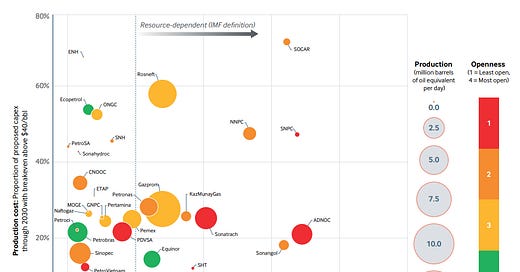Big Oil's bigger brothers
The battle to supply the "last barrel" in a carbon constrained future
When it comes to channelling the ire of environmental campaigners, the five major energy companies - BP, Shell, Total, Exxon and Chevron - tend to get all the attention.
They are easy targets of course; well-known consumer brands, ubiquitous physical targets, and a significant investor base. Despite the pressure imposed on these companies to change their ways and divest of their fossil fuel producing assets, it’s worth bearing in mind that collectively they only account for 15% of global oil and gas output (see Not just hot air?).
When an oil or gas company divests, it doesn’t simply close their extractive business, sell the parts for scrap and move on to something greener. They will want to maximize the value they get for that asset by selling it onto the highest bidder. The oil and gas producing assets may no longer be on the books of Big Oil, it’s on someone else’s books.
Divestment campaigners may celebrate the victory, but it will be a pyrrhic one if the assets are simply transferred to a less accountable company with little need to pander to outside interests. All too often, it is the state-led national oil companies (NOC’s) that picks up the pieces left over as the private sector retreats.
And so, to really make a dent in global fossil fuel related emissions requires engaging with the NOC’s - the “hidden half” of the oil and gas industry. These state-led behemoths produce the majority of the worlds oil and gas, often operating in jurisdictions with weak environmental rules.
As the rest of the oil and gas industry gets shamed into slimming down, the power of the NOC’s is likely to grow.
However, as we’ll see, to paint all NOC’s in the same light would be a mistake. When it comes to the energy transition and reaching net zero, each NOC is exposed to very different incentives.
Lets dive in.



